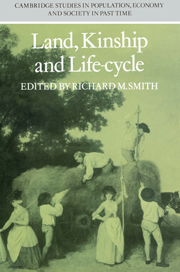Book contents
- Frontmatter
- Contents
- List of contributors
- Preface
- 1 Some issues concerning families and their property in rural England 1250–1800
- 2 Population pressure, inheritance and the land market in a fourteenth-century peasant community
- 3 Families and their land in an area of partible inheritance: Redgrave, Suffolk 1260–1320
- 4 Population changes and the transfer of customary land on a Cambridgeshire manor in the fourteenth century
- 5 Industrial employment and the rural land market 1380– 1520
- 6 Changes in the size of peasant holdings in some west midland villages 1400–1540
- 7 The erosion of the family–land bond in the late fourteenth and fifteenth centuries: a methodological note
- 8 Changes in the link between families and land in the west midlands in the fourteenth and fifteenth centuries
- 9 Kinship in an English village: Terling, Essex 1550–1700
- 10 The myth of the peasantry: family and economy in a northern parish
- 11 Poverty, poor relief and the life-cycle: some evidence from seventeenth-century Norfolk
- 12 The receipt of poor relief and family situation: Aldenham, Hertfordshire 1630–90
- 13 Widows in pre-industrial society: an essay upon their economic functions
- 14 Real property, marriage and children: the evidence from four pre-industrial communities
- 15 The nineteenth-century peasantry of Melbourn, Cambridgeshire
- Consolidated Bibliography
- Index
10 - The myth of the peasantry: family and economy in a northern parish
Published online by Cambridge University Press: 19 October 2009
- Frontmatter
- Contents
- List of contributors
- Preface
- 1 Some issues concerning families and their property in rural England 1250–1800
- 2 Population pressure, inheritance and the land market in a fourteenth-century peasant community
- 3 Families and their land in an area of partible inheritance: Redgrave, Suffolk 1260–1320
- 4 Population changes and the transfer of customary land on a Cambridgeshire manor in the fourteenth century
- 5 Industrial employment and the rural land market 1380– 1520
- 6 Changes in the size of peasant holdings in some west midland villages 1400–1540
- 7 The erosion of the family–land bond in the late fourteenth and fifteenth centuries: a methodological note
- 8 Changes in the link between families and land in the west midlands in the fourteenth and fifteenth centuries
- 9 Kinship in an English village: Terling, Essex 1550–1700
- 10 The myth of the peasantry: family and economy in a northern parish
- 11 Poverty, poor relief and the life-cycle: some evidence from seventeenth-century Norfolk
- 12 The receipt of poor relief and family situation: Aldenham, Hertfordshire 1630–90
- 13 Widows in pre-industrial society: an essay upon their economic functions
- 14 Real property, marriage and children: the evidence from four pre-industrial communities
- 15 The nineteenth-century peasantry of Melbourn, Cambridgeshire
- Consolidated Bibliography
- Index
Summary
Historians and sociologists agree that England between the thirteenth and eighteenth centuries was a ‘peasant’ nation. By this they often mean no more than that it fitted within the definition proposed by Firth when he wrote that by a peasant community ‘one means a system of small-scale producers, with a simple technology and equipment, often relying primarily for their subsistence on what they themselves produce. The primary means of livelihood of the peasant is cultivation of the soil.’ England would also appear to have been a peasant nation in the more precise sense that it was, to follow Kroeber and Redfield, a society where those living in the countryside constituted a ‘part-culture’ dependent on towns, markets and a state. One consequence of this interpretation is that the basic contrast is held to be between industrial nations on the one hand and ‘peasant’ nations on the other. Thus England is lumped with continental Europe, Ireland and Scotland up to the nineteenth century, with pre-revolutionary Russia and China and with contemporary India and Mexico. It is assumed that useful lessons can be learnt by comparing basically similar social and economic structures. There has been a growing interest recently in refining such a crude dichotomy in order to make it possible to distinguish between different agrarian systems. Following the lead of Chayanov it has been suggested that one extra feature is needed in order to make the label ‘peasant’ appropriate for an agricultural ‘part-society’. This final criterion is described by Thorner as follows.
- Type
- Chapter
- Information
- Land, Kinship and Life-Cycle , pp. 333 - 350Publisher: Cambridge University PressPrint publication year: 1985
- 1
- Cited by



